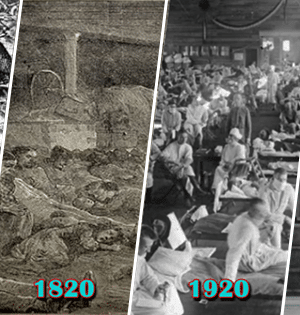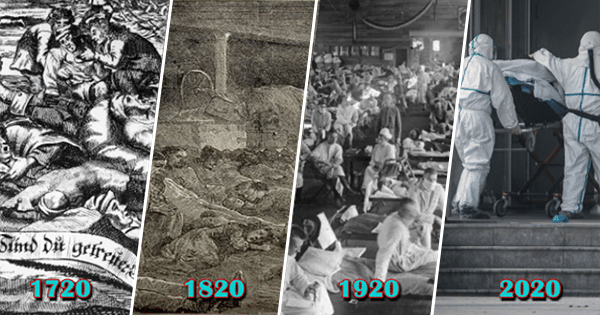- Ice skating rinks in Seville this Christmas
- Christmas Mapping ‘Navigalia’ in the river of Seville. Dates, passes and prices 2024
- Christmas lighting in Seville. Lights on. Christmas lights
- Itinerary, Tour schedule and the Cavalcade of the Magi from Sevilla 2025
- Christmas Menus in Seville
- Belen of Sanlúcar la Mayor. Christmas in Sevilla
- The Cirque del Sol returns to Seville with 'Alegría'. 2024
- List of Booths April Fair
- April Fair in Seville 2024. From 14 to the 20 April
- Valentine menu Sevilla | Valentine dinner Sevilla | Valentine Romantic Dinner
Epidemic each 100 years old: over 1720, wrath 1820, Spanish flu 1920, coronavirus 2020
Did you found interesting?

Every hundred years, It seems to have a pandemic, over 1720, cholera epidemic 1820 Spanish and flu 1920 and now the Coronavirus 2020.
Year 1720:
This year there was a pandemic of bubonic plague large-scale, also called the Great Plague of Marseille. Records show that the bacteria killed about 100.000 people in Marseille.
It is assumed that the bacteria is transmitted by infected flies with this bacteria.
Year 1820:
This year was a cholera pandemic, It held in Asia, in the countries of Thailand, Indonesia and the Philippines. There were more than 100,000 deaths due to this bacteria. It is said that the pandemic began with people who drank water from lakes contaminated with this bacteria.
Year 1920:
The Spanish flu that took place in the year 1920, This virus infected 500 million people and killed more than 100 million people worldwide, This was the deadliest pandemic in history.
Year 2020:
After another 100 years becomes an epidemic. Is it just a coincidence?
5 Chinese cities 11 million people are in quarantine, completely isolated from the rest of the world.
The coronavirus has killed 36.222 people worldwide and 7.424 in Spain so far, despite the efforts of the government and other institutions to quarantine entire cities, it seems that the virus has already spread worldwide.

SOURCE: https://medjouel.com/es/une-epidemie-tous-les-100-ans-peste-de-1720-cholera-de-1820-grippe-espagnole-de-1920-coronavirus-de-2020/



















